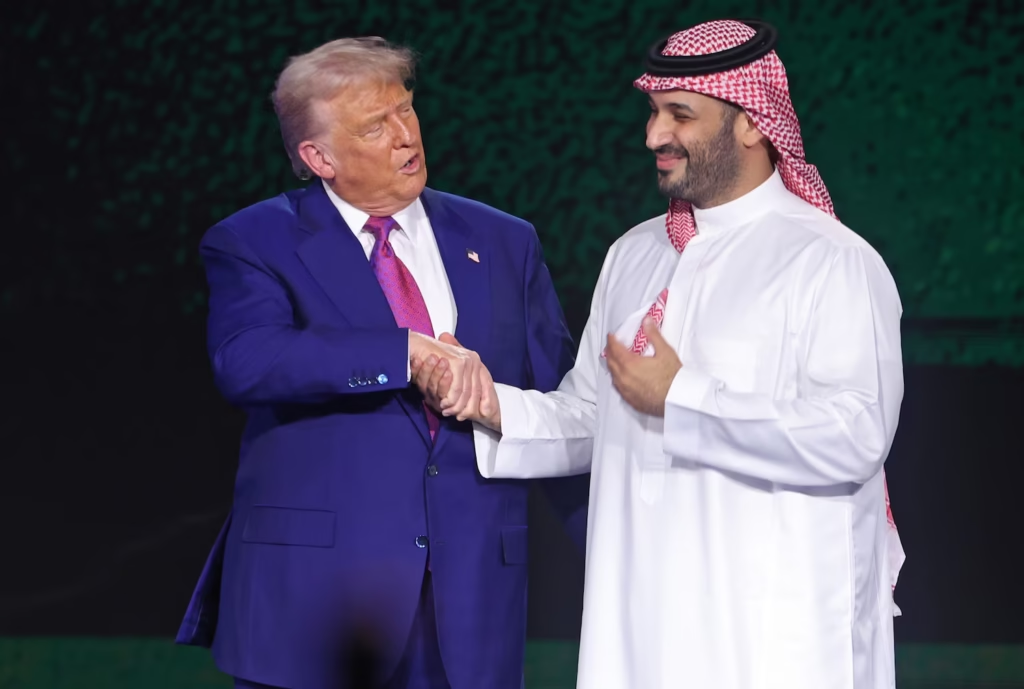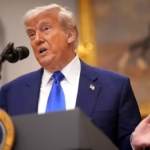On May 13, 2025, President Donald Trump delivered what was billed as a “major foreign policy address” during the U.S.-Saudi Investment Forum in Riyadh, Saudi Arabia. However, in a surprising turn of events, the majority of the speech, instead of focusing on the Middle East and its geopolitical challenges, was dominated by Trump’s domestic policies, his personal praise of Saudi Crown Prince Mohammed bin Salman (MBS), and an impassioned defense of the relationship between the United States and Saudi Arabia. The speech marked a significant departure from the diplomatic tone often seen in U.S. foreign policy discussions, especially regarding MBS, whose controversial role in the assassination of Washington Post journalist Jamal Khashoggi has been widely condemned internationally.
Trump’s remarks, while acknowledging the complex issues surrounding the crown prince’s leadership, were overwhelmingly positive. The speech featured strong commendations of MBS’s economic and leadership achievements, including a recognition of Saudi Arabia’s role in shaping the region and its growing influence on the global stage. In a moment that stunned many observers, Trump enthusiastically praised the crown prince, saying, “He’s your greatest representative, greatest representative. And if I didn’t like him, I’d get out of here so fast. You know that, don’t you? He knows me well. I do — I like him a lot. I like him too much. That’s why we give so much, you know? Too much. I like you too much.”
The praise from Trump stood in stark contrast to the international condemnation that MBS faced following the release of the U.S. intelligence community’s report in 2021, which concluded that the crown prince approved the assassination of Khashoggi in 2018. The findings of this report caused a global uproar, with leaders from various countries, including then-President Joe Biden, calling for accountability and taking steps to limit interactions with the Saudi leadership. Biden’s visit to Saudi Arabia in 2022, where he famously fist-bumped MBS, was criticized for being too soft on the crown prince. Biden’s stance, which had labeled Saudi Arabia a “pariah” state, was quickly overshadowed by Trump’s rhetoric of friendship and camaraderie with MBS during his speech.
At the U.S.-Saudi Investment Forum, Trump also offered effusive praise for the economic transformation underway in Saudi Arabia, particularly under the leadership of Crown Prince Mohammed. Trump referred to Riyadh as not only the seat of government but also a “major business, cultural, and high-tech capital of the entire world.” The president went on to joke with MBS, asking, “Mohammed, do you sleep at night? How do you sleep?” The remark was met with applause from the audience, which included influential Saudi royal family members and some of the world’s most powerful business leaders, including Tesla CEO Elon Musk, who was seated prominently during the address.
Trump’s remarks also included a nostalgic reflection on the economic climate during his time in office. “For the people of this room, the days of economic misery under the last administration are rapidly giving way to the greatest economy in the history of the world,” Trump said, referring to the period after his presidency. He attributed much of Saudi Arabia’s recent economic development to MBS’s leadership, praising the crown prince for silencing critics who once doubted the kingdom’s ability to achieve such growth. “Critics doubted that it was possible, what you’ve done, but over the past eight years, Saudi Arabia has proved the critics totally wrong,” Trump said, further emphasizing the close bond between the two leaders.
Trump’s speech also took an unexpected turn when he announced that he would be ordering the end of sanctions on Syria, a move he claimed was made at the request of both Saudi Arabia and Turkey. “Oh, what I do for the crown prince,” Trump joked, referring to the sanctions, which had previously been considered one of the most significant tools in pressuring the Syrian government. Despite their previous function in pressuring the Syrian regime, Trump suggested that it was now time for Syria to “shine,” signaling a shift in the U.S. approach to the region. The decision to lift sanctions, which is likely to have far-reaching implications for U.S. foreign policy in the Middle East, came as a surprise to many analysts, particularly given the volatile situation in Syria and the longstanding U.S. position against the Assad regime.
Throughout the address, Trump also took the opportunity to reaffirm his stance on immigration and other domestic issues. “The United States is the hottest country, with the exception of your country,” he told MBS, a remark that was met with laughter from the crowd. While he stopped short of making any definitive statements, Trump’s comment appeared to signal the growing influence of Saudi Arabia on the global stage, and his willingness to continue fostering a close relationship with the kingdom, even in the face of international scrutiny.
Trump’s decision to focus largely on his personal relationship with the Saudi crown prince and his domestic policies rather than a robust discussion of the Middle East’s geopolitical landscape raised eyebrows among international observers. Many had expected the speech to address pressing issues such as the ongoing conflicts in Yemen and Syria, the tensions between Saudi Arabia and Iran, and the broader efforts to stabilize the region. Instead, the president’s comments centered largely on the economic prosperity he attributed to his administration’s policies and the friendship he had cultivated with MBS.
The timing of Trump’s remarks is also noteworthy. As the 2024 U.S. presidential election approaches, the former president’s foreign policy decisions—and his rhetoric—are likely to become a focal point in the race. Trump’s strong endorsement of Saudi Arabia and MBS comes as a stark contrast to Biden’s more cautious approach, which has included efforts to balance the U.S.-Saudi relationship with human rights concerns and regional stability. While Biden has sought to distance his administration from MBS in the aftermath of the Khashoggi killing, Trump’s remarks suggest that he is willing to overlook past controversies and focus instead on the strategic and economic advantages of a closer U.S.-Saudi relationship.
The speech also marks a significant shift in the U.S. approach to foreign relations under Trump’s leadership. By elevating Saudi Arabia’s economic success and reinforcing his personal ties to MBS, Trump is presenting himself as a champion of international partnerships that prioritize economic growth and strategic alliances over human rights considerations. This approach may resonate with some voters who view economic success and strong alliances as essential to the U.S. position in the world, but it is also likely to face criticism from those who believe that U.S. foreign policy should prioritize human rights and the rule of law.
As the U.S.-Saudi Investment Forum concluded, it was clear that Trump’s speech would be remembered not just for its praise of MBS and Saudi Arabia but also for the broader implications it holds for U.S. foreign policy moving forward. By celebrating the Saudi crown prince’s leadership and downplaying the human rights concerns that have dominated U.S.-Saudi relations in recent years, Trump is setting the stage for a potential reevaluation of the U.S. role in the Middle East and its relationship with one of the region’s most influential powers.
As the world watches closely, the question remains whether this shift in U.S. foreign policy under Trump will be sustained, particularly as the 2024 election looms. Trump’s embrace of MBS and his focus on economic partnerships suggest a shift away from the policies of his predecessor, but the long-term impact on the Middle East and U.S. relations with other global powers remains to be seen.



